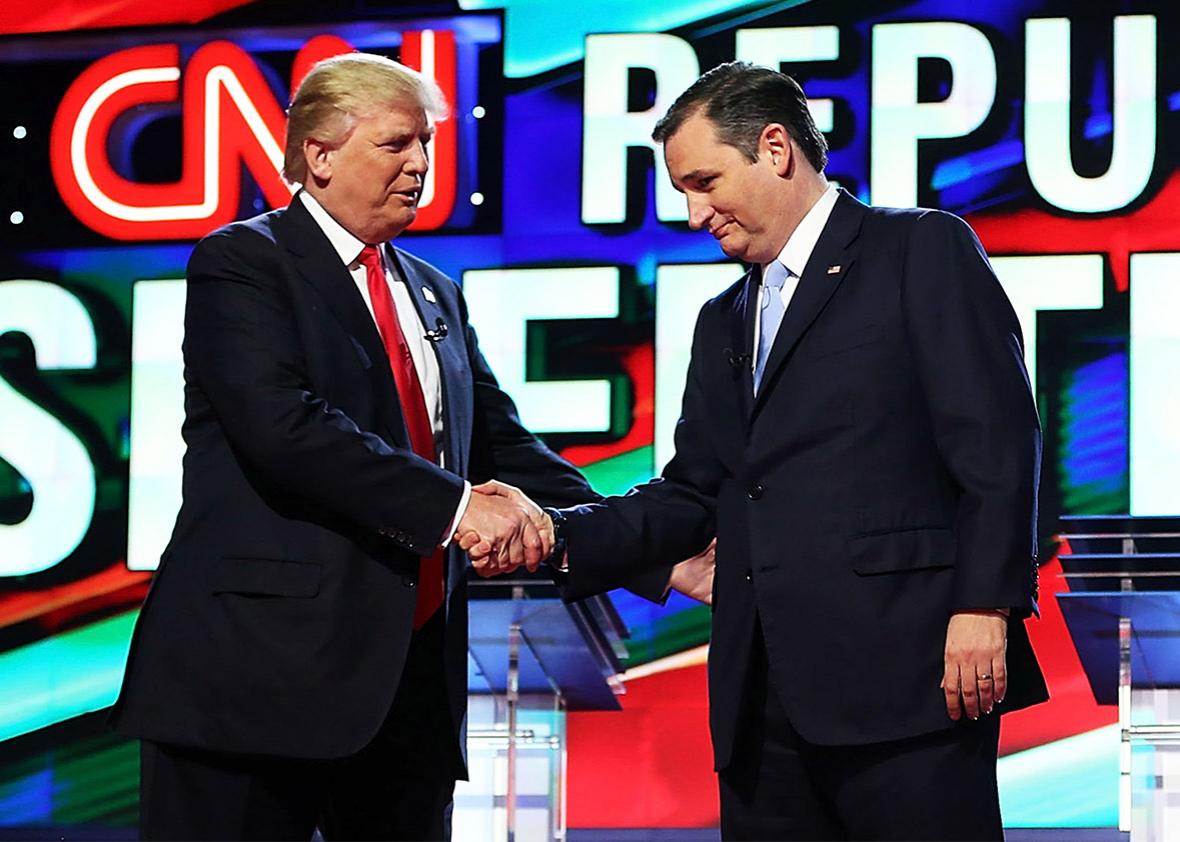“If you look at a number of the candidates that took on Donald Trump early on,” Sen. Ted Cruz told Wisconsin radio host Charlie Sykes on Wednesday, “they ended up as roadkill.”
These comments mark the first public occasion of Cruz describing the rationale behind his roughly seven-month strategy of kissing Donald Trump’s ass. Seven months ago seems like a quaint and gentler time in American politics, considering that Trump and his allies are now, for example, pushing the message that Heidi Cruz is Thomas Eagleton without the looks. These garbage attacks, which are really happening, worked the usually self-possessed Cruz into a lather on Thursday, culminating in Cruz calling Trump a “sniveling coward.” (He was not so enraged, however, as to rule out supporting Trump should he become the nominee. Country comes first.)
“Our objective was simple from the beginning,” Cruz continued in his conversation with Sykes. “It is to win this race, to win the nomination, and then beat Hillary Clinton and turn this country around.”
“And not be roadkill,” Sykes said.
“And not be roadkill,” Cruz added. “I am very strongly committed on the anti-roadkill approach.”
This gets some recent history wrong. More importantly, it doesn’t cut it as a morally exculpatory explanation for his behavior last year.
Cruz is a smart, calculating politician, and surely from the beginning he recognized that Trump was a nightmarish fraud. The reasoning here that he didn’t go after his principal rival for the nomination because he was worried about Trump trouncing him confirms cowardice on his part. It also promotes a causal myth about why those other candidates who did go after Trump became “roadkill.” Worst of all, it portrays the relationship that Cruz sought with Trump too innocently. He wasn’t making an end-run around Trump so much as he was using Trump as a tackle to clear his own lane through the field.
To whom is Cruz referring with the flattering metaphor of “roadkill”? Let us survey the dead. Dig deep into your memory and you might recall that former Texas Gov. Rick Perry not only ran for president this cycle but was the first candidate to take a hard swing at Trump. “Donald Trump’s candidacy is a cancer on conservatism,” Perry said in a July anti-Trump speech, “and it must be clearly diagnosed, excised, and discarded.” Then-governor of Louisiana Bobby Jindal similarly assaulted Trump in early September, calling him a “narcissist” and an “egomaniac” who “has no understanding of policy” and “lacks the intellectual curiosity to even learn,” among other (accurate) things. “I think [Trump]’s a wrecking ball for the future of the Republican Party with the Hispanic community and we need to push back,” Sen. Lindsey Graham told CNN in July. “This is a defining moment for the Republican Party. We need to reject this.” The following day Trump displayed Graham’s cellphone number at a public event.
These candidates were among the first to drop out of the race. But contrary to popular myth, it wasn’t the omnipotent Trump who took them out in single combat. Their candidacies were dead on arrival, and their efforts to go after Trump were desperate eleventh-hour maneuvers to win national publicity and earn slots on the main debating stage. This doesn’t mean that they were making up their hatred of Trump, but the reason they felt so compelled to voice it then was because he was the channel through which media coverage flowed. They didn’t lose because they were attacking Trump; they were attacking Trump because they were losing.
Where was Cruz during all of this? He wasn’t just keeping his distance from Trump in the campaign’s early stages, as you could argue Jeb Bush and Marco Rubio were. He was actively courting and boosting Trump. The two had met in person “at least five times” by late August, the Daily Beast reported. One of those meetings, which produced a cheery thumbs-up photo op, went down at Trump Tower—by Cruz’s request. “I’m a big fan of Donald Trump. I think Donald Trump is bringing a bold, brash voice to this presidential race,” Cruz said before the meeting. “One of the reasons you’re seeing so many 2016 candidates go out of their way to smack Donald Trump is they don’t like a politician that speaks directly about the challenges of illegal immigration.”
That gets to the heart of Cruz’s “bear hug” of Trump in these months—to use the more apt term that Cruz himself offered last December, in private, to describe the relationship. Cruz was encouraging Trump’s immigration talk because it exposed the main primary weakness of Jeb Bush and Marco Rubio, whom he considered the real front-runners. Trump would tilt the electorate away from the “establishment candidates”; Trump himself would eventually fade; and all of his supporters would migrate to Cruz. Trump reshaped the field, all right. But he didn’t collapse.
What’s most inexcusable and morally shameful about Cruz during this time—and he would probably agree—is the way he stood down during some of Trump’s vilest moments. When Trump insulted Sen. John McCain’s war record in July, Cruz refused to criticize Trump and instead blamed the media for trying to incite “Republican-on-Republican violence.” When Trump, following the first Fox News debate in August, said that moderator Megyn Kelly had “blood coming out of her—wherever,” Cruz again refused to take a stand. “I’m not going to engage in the back-and-forth on personalities,” he said. “I get the media loves that. That’s what you want to cover, is the soap opera of back-and-forth.”
Now Trump is facing near-universal condemnation for his personal smears against Cruz’s family. Cruz should consider himself lucky that others have a stronger sense of decency than he could ever muster during Trump’s rise.
